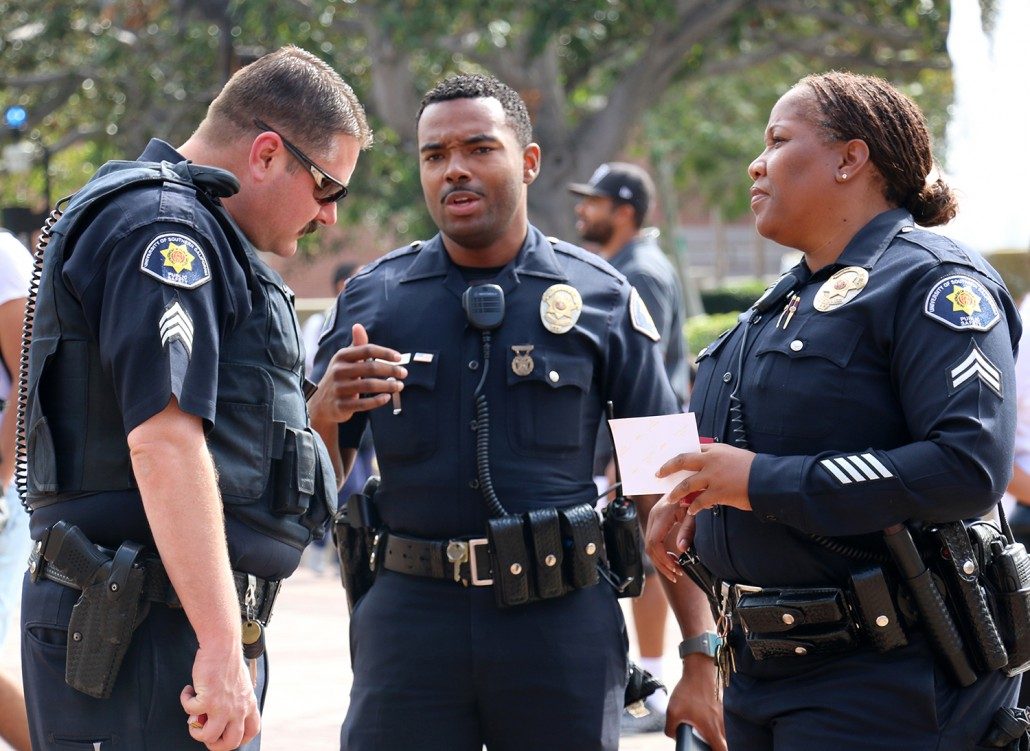DPS warns of student drug abuse, opioids

(Daily Trojan file photos)
In a letter to the USC community, Department of Public Safety Chief John Thomas and Chief Health Officer Sarah Van Orman warned students about the risks of drug use, particularly opioids. Since the start of the semester, at least nine students have died. Three of these deaths have been confirmed as suicides, and some of the others are still under investigation, but University officials suspect some of the deaths could be related to drug and opioid use.
In an interview with the Daily Trojan, DPS Captain Edgar Palmer said the recent student deaths sparked increased concern regarding drug use.
“There have been several recent overdose deaths or what are perceived as overdose deaths,” Palmer said. “We just don’t know [the cause] yet because the coroner’s report has not come back. So this is just an assumption, but in these recent deaths, narcotic abuse is something that has been considered.”
According to Thomas and Van Orman, students should be aware of the risks posed by prescription medications such as oxycodone, Percocet, Vicodin, morphine, fentanyl and heroin.
“In addition to the direct effects of each substance, drugs shared for recreational use can be tainted or mixed with other substances to increase its effects, sometimes without a user’s knowledge,” the letter read. “This practice is rising and is linked to overdose and deaths.”
In 2016, the American College Health Association released a set of guidelines to help universities prevent and create strategies for treating opioid misuse among students. According to the Drug Policy Alliance, accidental drug overdose is the leading cause of death in the U.S. for individuals under 50, and nearly two-thirds of overdose deaths in 2016 involved prescription medication or illegal opioids.
California has also recently faced issues with recreational drugs such as cocaine being laced with fentanyl, an opioid that has caused thousands of deaths across the nation.
Palmer encouraged people in the community to support one another by identifying students who need help.
“I think that when you’re rooming with another student and that student is having issues, it is certainly my belief that someone is aware, and when someone is anywhere, I think the thing that people tend to do is keep quiet about it and pretend like it’s not there,” Palmer said. “And when something happens, it’s like, ‘Oh yeah, I saw that coming,’ so I think when you see someone in need or there is a problem, I think that — even anonymously — you need to alert someone.”
Students are able to anonymously ask for help from the University or recommend a peer by contacting Trojans Care 4 Trojans, an initiative from the Office of Campus Wellness and Crisis Intervention.
“If you’re feeling like you might harm yourself, or you’re feeling like you’re having trouble coping, and you are using drugs and alcohol, there are means to get that student help,” Palmer said. “But it is something that we need to be made aware of.”
The letter encouraged students to seek treatment and to speak with their medical providers to discuss options. Thomas and Van Orman also told students about Naloxone, a nasal spray that can reverse the impacts of an accidental overdose that can be found at the on-campus pharmacy.
While Palmer said DPS hasn’t noticed a formal pattern indicating higher rates of drug use, he has witnessed an increase in students calling the department and seeking help.
“What I have seen more of is students that are calling because they need assistance, and we are happy for that in that the person recognizes they need help and they call us,” Palmer said. “We get to the scene, and we are able to connect them with some type of service.”

